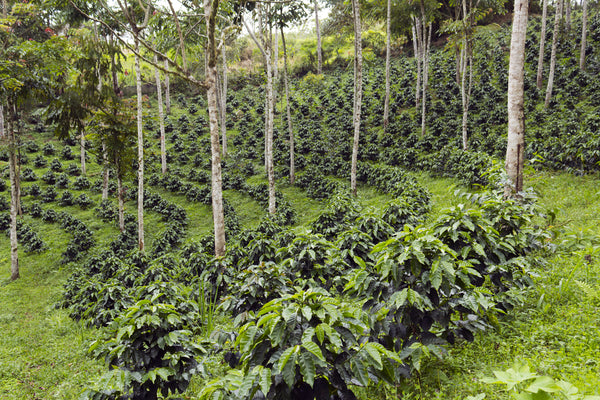
Coffee, the morning beverage of choice for many, is deeply entrenched in our culture. However, there is the issue of the environmental impact of coffee production, raising questions about our role as consumers and suppliers in supporting sustainable practices.
In our pursuit of a greener future, understanding the environmental impact of our daily coffee habit is a crucial first step. By making informed choices, we can make our coffee consumption a part of the solution rather than the problem. This article will outline the broader environmental impacts of coffee – both positive and negative – as well as the choices you can make to reduce your carbon footprint.
Coffee Consumption in Australia
Australia's relationship with coffee runs deep, with sparks flying as far back as 1788. Fast forward a few decades, and the coffee industry here has experienced an exponential growth. It has gone from being a simple beverage to a cultural phenomenon, a symbol of camaraderie and a matter of state rivalries. The numbers support this intense passion for coffee, with Australians consuming fifty million kilograms of coffee per year. That’s as much as 333 blue whales!
This coffee culture, while it supports the economy and fuels the daily grind of many Australians, invites an important question. What is the environmental impact of such a huge rate of coffee consumption?
The Environmental Footprint of Coffee Production
Deforestation, for starters, is a major environmental concern related to coffee production. When we think of our morning espresso or cappuccino, it's easy to forget that its origins lie in the lush coffee plantations often tucked away in tropical regions. The unfortunate reality is that these coffee plantations come at a huge environmental cost.
Large areas of tropical rainforests, which are biodiversity hotspots, are cleared to make way for coffee cultivation. This destruction of habitat not only contributes to the loss of plant and animal life but also leads to topsoil erosion. The fertile top layers of soil are washed away without the protective cover of trees, affecting the health of the soil and leading to further degradation of the environment.
The environmental issues don’t stop at deforestation and soil erosion. Non-organic coffee farming practices have their own set of problems. The use of synthetic fertilisers and pesticides is common in these practices, which leads to water pollution. When these chemicals leach into the local water bodies, they disrupt aquatic plants and ecosystems, harm wildlife, and can even affect the local communities who rely on these water sources.
Coffee production is also a significant contributor to greenhouse gas emissions. This is due to several factors including the energy used in coffee processing and transportation, the methane released from coffee waste in landfills, and the carbon dioxide released due to deforestation for coffee plantations. These emissions contribute to the overall problem of global warming and climate change.

The Environmental Benefits of Sustainable Coffee Production
The environmental implications of coffee production are undeniable, yet it's equally important to shed light on the environmental benefits associated with coffee cultivation, given the right practices. Coffee plants, for instance, are known to be very effective in carbon sequestration - a process that helps in reducing the atmospheric CO2 levels. Carbon sequestration is a natural or artificial process by which carbon dioxide (CO2) is captured from the atmosphere and stored for a long period. This process is integral to mitigating or deferring global warming and avoiding hazardous climate change.
Coffee plants, when grown in substantial numbers, can significantly contribute to this process, thus helping offset the carbon emissions from other stages of coffee production and consumption. This, however, is contingent on the farming practices being employed. Unsustainable farming methods, such as clear-cutting forests for coffee plantations, can negate these benefits.
Another noteworthy benefit of coffee cultivation, especially when done sustainably, is its potential to support high levels of biodiversity. This is particularly true for shade-grown coffee farms. Shade-grown coffee is a traditional method of coffee cultivation where coffee shrubs grow under a canopy of diverse tree species. This method not only provides a habitat for a wide range of flora and fauna but also improves soil health and reduces the need for synthetic fertilisers and pesticides.
Organic farming is another sustainable practice gaining popularity in the coffee industry. Organic coffee is grown without synthetic fertilisers and pesticides, which are major contributors to water pollution and soil degradation. Instead, organic farming relies on natural processes and inputs, like composting and crop rotation, to maintain soil health and control pests. This is a more sustainable approach, reducing the environmental footprint of coffee production while also contributing to better coffee quality and farmer health.
However, the transition to organic farming is not without its challenges. For farmers, this transition often involves a temporary dip in yield and higher production costs, at least initially. This is why it's crucial for consumers, businesses, and policymakers to support organic farmers during this transition phase, for instance, through fair trade and direct trade models, which ensure that farmers receive fair compensation for their efforts.
Strategies for Reducing Environmental Impact
The environmental implications of our love for coffee are strikingly significant. Thankfully, there are various strategies that farmers and consumers can implement to reduce the environmental impact of coffee and transform our daily caffeine fix into an eco-friendly habit.
Promoting sustainable farming practices is one of the most effective ways we can decrease the ecological footprint of our coffee consumption. Shade-grown coffee, for instance, is a farming practice that involves cultivating coffee plants under a canopy of trees. This method not only reduces the need for deforestation, but also promotes a healthier ecosystem. The trees provide a natural habitat for a wide variety of species, helping preserve biodiversity. Additionally, they assist in preventing soil erosion and maintaining soil health, which can otherwise be severely compromised due to excessive coffee farming.
Organic coffee bean farming is another sustainable practice that can drastically reduce the environmental impact of coffee. Unlike traditional coffee farming, organic methods avoid the use of synthetic fertilisers and pesticides. These chemicals can contaminate water bodies and pose a significant threat to aquatic life. Organic farming helps to preserve our water sources and protect the ecological balance of the diverse areas coffee is grown in.
Supporting fair trade is another strategy that can encourage more sustainable practices in the coffee industry. Fair trade ensures that coffee growers are fairly compensated for their work, which can incentivize them to adopt more environmentally-friendly farming practices. This creates a ripple effect, encouraging sustainability throughout the entire coffee supply chain. If you’re looking for a smooth and delicious fair trade coffee option, why not give our Fairtrade Organic Blend a try?
Waste reduction is a critical aspect of decreasing the environmental impact of coffee. For instance, composting coffee grounds is an excellent way to reduce waste. Throwing your coffee grounds out in general household rubbish prevents them from decomposing naturally, increasing the amount of greenhouse gases they produce in landfill. Coffee grounds are rich in nitrogen, which makes them a valuable addition to compost. They are increasingly popular as a home fertiliser ingredient, perfect for use in your garden to nourish plants and improve soil structure.
Another effective waste reduction strategy is the use of reusable coffee cups. Research shows Australians use 1.8 billion disposable coffee cups every year. Because of their plastic lining, these cups cannot be recycled using traditional means. By opting for a reusable glass, metal or ceramic cup, you can substantially reduce waste and contribute to a more sustainable coffee culture. Plus, a growing number of coffee shops offer a discount for orders using reusable cups – it’s a win-win!

Frequently Asked Questions
What is shade-grown coffee?
Shade-grown coffee is a traditional method of cultivating coffee beans where they are grown under the shaded canopy of native trees. This method mimics the coffee plant’s natural growth in the shaded understory of forests, contributing to more sustainable farming practices. Unlike conventional coffee farms that can often resemble barren fields, shade-grown coffee farms are lush landscapes teeming with life, thereby maintaining the ecological balance.
Shade-grown coffee farms provide habitats for a myriad of species, fostering biodiversity. Birds, in particular, find refuge in these farms, where they act as natural pest controls, reducing the need for harmful pesticides. Moreover, trees in shade coffee farms serve as carbon sinks, mitigating climate change by absorbing CO2 from the atmosphere.
How does coffee growing contribute to deforestation?
Coffee cultivation has a significant environmental footprint. It contributes to deforestation primarily when forests are cleared to make way for coffee plantations. This is particularly prevalent in areas where the sun-grown coffee production method is used. In this method, trees are cleared to allow more sunlight, increasing coffee yields in the short term. Unfortunately, the production of sun-grown coffee leads to soil erosion, water pollution, and a significant loss of wildlife habitat, resulting in biodiversity loss.
Furthermore, as forests are vital carbon sinks, their destruction for coffee plantations contributes to increased greenhouse gas emissions. This is a pressing concern given the urgent need to combat climate change. Choosing shade-grown or other eco-friendly coffee production methods reduces demand and your individual carbon footprint.
What are the benefits of organic coffee?
Organic coffee cultivation offers numerous environmental benefits. It's grown without synthetic fertilisers, pesticides, or herbicides, which are often used in conventional coffee farming. By avoiding these potentially harmful, organic coffee farming helps maintain clean bodies of water and promotes healthier soil, teeming with beneficial microorganisms.
Additionally, organic coffee farming helps combat climate change. Composting and cover cropping, common practices in organic farming, help retain carbon in the soil. Moreover, organic farms often maintain a variety of plants beyond coffee, supporting biodiversity and creating a more resilient ecosystem.
Some consumers also argue that organic coffee beans produce a smoother, richer cup of coffee, though this depends on your individual tastes.
Get Environmentally Sustainable Coffee in Australia
Rounding off our dive into coffee and its environmental impacts, it's clear that our daily coffee habits, while enjoyable, have considerable consequences. It’s essential that we, as conscientious consumers, begin to acknowledge these impacts and strive to make changes where possible.
If you’re looking for fairtrade and organic coffee beans in Australia, Green Bean Coffee has what you need. With our huge range of carefully selected green and roasted coffee beans, there’s a variety of coffee for every taste. To discuss your ideal eco-friendly coffee choice, contact our friendly and knowledgeable staff on 02 9870 7898.
-
Prompt Delivery
-
Freshness Guaranteed
-
Personalised Service
-
Established in 2000

